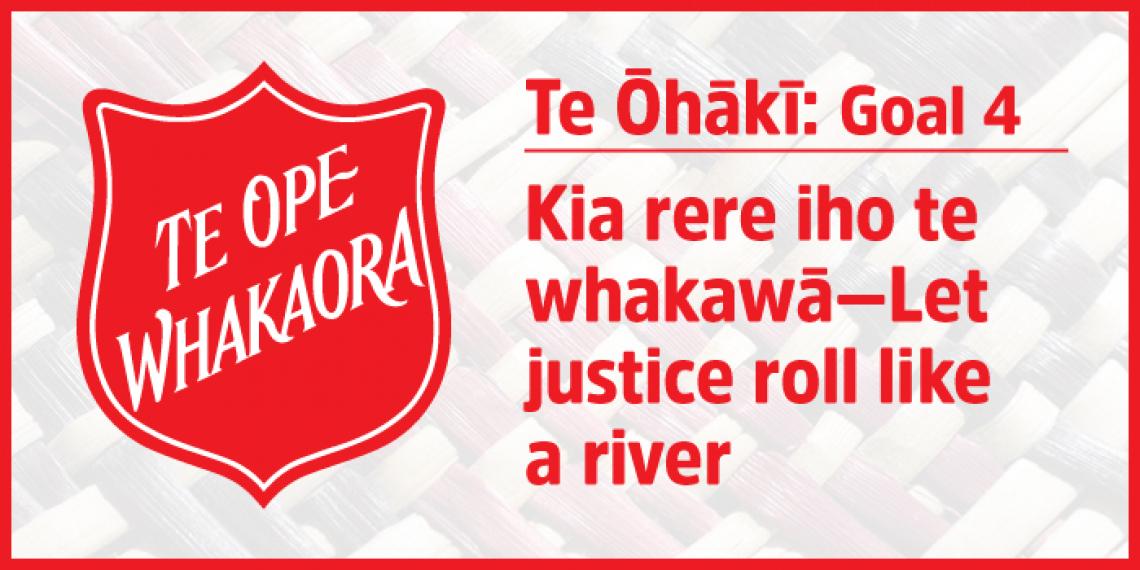You are here
Te Ōhākī: Kia rere iho te whakawā—Let justice roll like a river

Goal 4: Kia Rere Iho Te Whakawā – Justice
‘Our response to the ongoing social injustice of poverty that impacts Māori shows commitment to reducing inequalities for Māori.’
Imagine you are situated near a dangerous river and people keep floating down this river towards you. They are struggling to keep their heads above water—some have even drowned. You and other rescuers work hard to pull them out of the river. Some you are able to resuscitate; for others it’s too late.
You try to secure more funding to hire more rescue workers. You try to make your rescue systems more efficient, but more and more people continue to come down the river. You keep a record, noting if they’re male or female, adult or child, first-timer or a familiar face.
You record their ethnicity and notice something very interesting: 40 per cent of those coming downstream are Māori! You know that only 15% of all the people in your area are Māori* … so why are they so overrepresented in this river?** You also realise you only have one Māori team member in your team of 25 and little knowledge of the historical and cultural context you are in.***
What is your response?
- Option 1: Maintain the status quo
This is ‘just the way it is’ and perhaps Māori aren’t as clever as others who can keep themselves out of the water or swim properly. You believe in a ‘one-size-fits-all’ approach and don’t believe in ‘special treatment’. And you’re actually feeling pretty good that you can provide a hand out of the river for people.
- Option 2: Upgrade
You build a fancy building close to the river, design a catchy logo and encourage the rescuers to keep working hard! Nifty ad campaigns attract attention and funding. You use this money to build better administrative systems, upskill your rescuers and provide eye-catching uniforms. You write catchy tunes about how much God loves the river people and meet regularly to talk about this.
- Option 3: Disturb the present
You realise someone needs to head upstream to find out why people are falling in the water—is the problem a broken bridge, a burst dam, or a new enemy? You explore why Māori are more impacted than others and deliberately seek out and welcome people to your team to help figure this out. You discover Māori have great solutions and can work together upstream to make change for all people.
The strength of your voice and the just action you insist upon begins to pump justice and fairness into the river and out to the wider environment. Now justice begins to roll through the land like the river—but this river of justice brings life.
Kia huri mai te whakawā ano he wai, te tika ano he awa nui! Do you know what I want? I want justice—oceans of it. I want fairness—rivers of it. That’s what I want. That’s all I want! (Amos 5:24, The Message).
God’s heart is for righteousness, fairness and justice, and we are challenged to make that our priority. This isn’t an add-on, optional extra or some ministry reserved for activists. It is right at the heart of true worship! (And if you don’t believe me, read the three verses that precede the one above.) For this reason, one of the goals of ‘Te Ōhākī’ is a strong focus on social justice issues that have an impact on Māori. We have committed ourselves in The Salvation Army to reducing inequalities and inequities for Māori, and never accepting that this is ‘just the way it is’.
The founders of The Salvation Army were also focused on social change and committed to justice—particularly for those whom William Booth called the ‘submerged tenth’. Booth was referring to the 10 percent of people drowning in poverty, homelessness, unemployment and other difficulties. Right now, right here in Aotearoa, we are struggling with the same issues, but the greatest burden is felt by Māori.
The only way this can change is if we choose to act. So what is your response?
Ideas for pursuing justice
- Increase your awareness of social issues by following Māori media, Māori news programmes and following Facebook pages such as Te Kaea, JustSpeak, and the NZ Human Rights Commission
- Take an active interest in social justice issues that impact Māori
- Support and resource Māori social justice champions in your corps/centre/region
- Support Māori leaders in your corps/centre through mentoring, supervision and training
- Experiment with social justice initiatives that specifically benefit Māori
- Meet with local Māori community leaders and seek their input about social justice issues
- Attend significant hui in your local area and invite Māori leaders/whānau to your gatherings
- Support existing Māori-led initiatives in your community and work towards Māori-led projects initiated by your corps/centre.
By Hana Seddon
* The Salvation Army’s Community Ministries centres across the country supported 15,394 Māori from 1 July 2016 to 30 June 2017 out of a total 38,705 clients (data from The Salvation Army’s Service and Mission Information System).
** Statistics NZ, 2013 Census: One-in-seven people (598,605 or 14.9 percent) usually living in New Zealand in 2013 belonged to the Māori ethnic group—a 5.9% increase from 2006.
*** Ethnicity data is held for Salvation Army officers, but not for other Salvationists/staff. Statistics NZ 2013 Census data shows that out of all who identified The Salvation Army as their religious affiliation, only 6% were Māori. This is also likely to include those supported by the Army, but not necessarily attending a corps or other Salvation Army faith expression.
- Read the Māori Ministry Strategic Plan